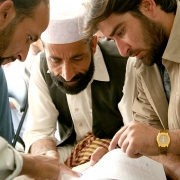What a horrible, stupid war. As historians debate whether militaries make the same mistake over and over again, we here on the opinion-research side of things run the same risk. But we don’t like to lose, so we do what we can to keep from being surprised by events.
Do you want to be taken by surprise by what happens when Russia loses this war?
Russia is Going to Lose
What do I mean by lose? Russia is militarily, politically and economically weakened to the point where it is less able to exert direct influence over its neighbors’ political systems, less effective at shaping public opinion and unable to invade its neighbors.
Plenty has been written about how the West misread what happened in 1991. Amidst the triumphalism of having “won the cold war” and reaching “the end of history,” too many policies privileged Russia’s interests at the expense of newly independent states including, but not only, Ukraine. Subsequently, many have struggled to develop rule of law, equal rights, uncontrolled media and fair elections under Russian influence.
Understand What’s Going to Happen Next
I’ve long been bearish on Ukraine’s ability to defeat Russia. I’ve thought a lot about how, post-victory, Ukrainians will approach politics without Russia occupying territory, without political parties led by corrupt Russian interests, and with a population deeply wounded by Russian atrocities.
We know post-victory Ukraine is going to be very different. I’ve already got questions I want to ask: How will the (generally flawed and unpopular) political parties respond to the challenges of reconstruction? From what quarters will the next generation of leadership emerge? Who or what will fill the vacuum – long dominated by Russian-oriented parties – in eastern Ukraine? We’ll only know by asking Ukrainians what they think.
I’ve also got questions about how dynamics in Belarus, Georgia, Moldova, Serbia and Hungary might change without the incentives provided or imposed by Russia. A weakened Russia may be less able to back up Lukashenka’s dictatorial control over Belarus. Will this give opposition forces the opening they’ve been positioning themselves for years to run through? But what do Belarusians think about a post-Russia future?
Georgians just killed a draft foreign agent law, a version of which has decimated Russian civil society by, among other things, playing on Soviet-era fears of foreign spying. Energized, could Georgians take the giant leap of evicting a weakened Russia from territory it has occupied since 2008? Who do Georgians think can lead that effort?
Russia is not going away. Indeed, Russia itself could be wracked by internal conflict and competition for power that’s unlikely to favor democrats. But what’s the spillover of that going to be in the North Caucasus and Siberia? Seems like it’s worth trying to understand what people there think about their future.
Ask the Questions and Listen to the Answers
Like at the end of the cold war, Russia’s failed war on Ukraine could cause liquefaction of the political soil in Eastern Europe and Central Asia. Political dynamics that have been frozen in amber for decades could disappear, reconstitute or explode into chaos. Arguments in favor or against such scenarios are legitimate and worthy of debate.
However, unlike 30 years ago, there’s zero excuse for assuming we know (or not caring!) what people in countries from the Balkans to the Chinese border think about such big changes. Listening to people that have been living with Russian influence makes it less likely we’ll be taken by surprise by the fallout from another major event, like Russia losing to Ukraine.
Contact Quirk Global Strategies to talk about new and clever ways to measure public opinion in complicated places.








